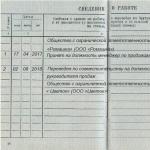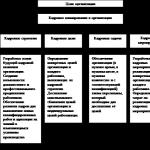One of the ways to improve the vocabulary of the German language is substantiation, which "represents the transformation of individual word forms into words by separating these forms from the system of forms of the corresponding word" [Levkovskaya 2004, 304].
According to the definition of M.D. Stepanova: " Substantiation - the transition of words to the class of nouns from other grammatical classes of words without the use of any derivational means (affixes, root changes(emphasis mine. - EK) ".
Substantiation has been known since the earliest periods of the development of the German language (compare: ahd jвmar - Jammer from the adjective jвmar - sad, mhd daz syese das SyЯe) and is widespread in modern German. This method of word formation in German is associated with the use of the article in it. The article, as you know, performs in the German language not only semantic functions (expression of certainty and uncertainty), but also purely grammatical functions. As a grammatical means, it expresses the categories of gender, number and case and primarily serves as an indicator of the belonging of a word to the grammatical class of nouns. Acting as a feature of a noun, the article thereby becomes a means of substantiation, cf.
leben - das Leben
“The expansion of the sphere of use of the article in the New High German period stimulated the spread of substantivation” [Ivleva 1986, 67].
Any significant part of speech, service word, interjection can be substantiated. The process of substantiation is “that this or that quality, property, state, action, attitude, emotion, etc., begin to be thought of objectively, in the form of the name of an object or phenomenon. The meaning of a word changes, its function in speech changes, and, consequently, its compatibility with other words and its role in the sentence. At the same time, the word acquires nominal grammatical categories, is formalized as a noun ”[Stepanova 1953, p. 102], cf.
Das Trostlose am Schildwachstehen war, daЯ man Zeit zum Nachdenken hatte. ...
The substantiated adjective das Trostlose, the substantiated infinitive Nachdenken, and the concatenation Schildwachstehen (that is, the infinitive substantiated together with the noun Schildwache, express various states, conceivable objectively. All three words are nouns with appropriate grammatical categories and perform the usual functions of a noun in a sentence ...
As noted earlier, the most common substantiation of the infinitive and the substantiation of adjectives and participles.
Infinitive- nominal verb form, i.e. a form that is genetically and functionally contiguous with the name.
In its semantics, the infinitive is very close to an abstract noun expressing the process of action or state as it is itself the name of this process. Acting as a member of a sentence, the infinitive actually performs nominal functions, compare: rauchen ist verboten (subject), ich hoffe dich zu sehen (addition), etc. Therefore, according to K.A. Levkovskaya, the substantiation of the infinitive is only a further development and confirmation of its basic semantic and grammatical properties and occurs especially easily. “Any infinitive can be substantiated in German, regardless of the lexical content and type of the verb” [Fedorov 1961, 68].
When substantivating, the infinitive acquires grammatical categories and grammatical forms of a noun... In addition to the grammatical categories of the gender (middle), expressed by the article, case inflection (the ending of the article, the ending -s in the genitive case) characteristic of verbal substantivations, they, as concrete names, can in a number of cases also have the category of number - singular and plural (das Schreiben - die Schreiben).
German scholars and Russian Germanists often subdivide verb substantiations on permanent and occasional("Random"). Due to the special specificity of these forms in the German language, due to the duality of their functions, they distinguish nouns formed from the infinitive by substantivating and included in the vocabulary of the German language (for example, das Vertrauen, das Leben, das Aussehen, das Treiben, etc., from the huge many substantivations formed in the process of speech Occasional formations are quite natural and can serve as an illustration of an important feature of the German language system - the combination in one word form of two different functions - word-formation and syntactic. This is precisely the phenomenon observed in the following examples:
Und Mettenheimer verstand jetzt, daI dieser Mann hinter ihm ausstieg und kein Entrinnen mхglich war.
Often this type of substantiation is combined with word composition, i.e. the infinitive is substantivized together with the words that complement it, which is a further development of this method of word formation. For example, das Zuhausesitzen - sitting at home (zu Hause sitzen - staying at home). The substantiation of the 2nd infinitive and the passive infinitive of the type das Gefragthaben or das Gefragtwerden is more or less random, for example, und dies Gefegtwerden von den Peitschen der Hхhe. or:
Das sieht hicht nach Hungergehabthaben aus….
In the latter case, the past tense infinitive is substantivated together with the noun Hunger, that is, we are dealing with a splicing.
Word formation is a separate topic for each language, and everywhere it has its own characteristics. Some provisions are similar for most language systems. It often happens that the rules of word formation are based on ordinary logic, having understood which, it is not at all difficult to master the whole topic. To do this, you need not only to blindly memorize new words, but to understand the principle of their structure.
What means substantive adjective?
German is similar to Russian in that there are a number of words - adjectives - that have been transformed into this part of speech from nouns. From our language, you can cite examples such as "scientist", "unemployed", "car driver", etc. It is always possible to add to these words such general words as man, man, woman, child - with the help of them they become full-fledged adjectives, and without them they remain nouns.
In German, substantive adjectives exist independently in speech:
- eine blinde Frau (adj. in combination with noun: a blind woman) - eine Blinde - blind (noun - substantiated adj.: blind);
- ein arbeitsloser Mann (adj. combined with noun: unemployed man), ein Arbeitsloser (noun - substantive adj.: unemployed).
Peculiarities
After such adjectives are substantiated into nouns, they retain all their basic features inherent in the name of the adjective:
- der Abgeordnete (deputy, delegate (man) - ein Abgeordneter; our deputy, delegate (man) - unser Abgeordneter);
- die Abgeordnete (deputy, delegate (woman) - eine Abgeordnete; our deputy, delegate (woman) - unsere Abgeordnete);
- Abgeordnete (some deputies, delegates); die Abgeordneten (certain deputies, delegates); viele Abgeordnete (many deputies, delegates); alle Abgeordneten (all MPs, delegates).
- Im Bürgermeisteramt haben wir unseren Abgeordneten getroffen. - We met our deputy at the mayor's office.
The examples clearly show that the "behavior" of substantive adjectives in German is exactly the same as that of ordinary adjectives. The only difference is that the former are always written with a capital letter, and are also independent.
Examples of basic substantive adjectives
In the German language there is a list of words that are used very often and are basic - you need to know them at the initial level of study:
- deputy - der Stellvertretende, deputy - die Stellvertretende;
- acquaintance - der Bekannte, acquaintance - die Bekannte;
- the traveler - der Reisende, the traveler - die Reisende;
- relative - der Verwandte, relative - die Verwandte;
- the criminal is der Kriminelle, the criminal is die Kriminelle;
- old man - der Alte, old woman - die Alte;
- sick - der Kranke, sick - die Kranke;
- young man - der Jugendliche, girl - die Jugendliche;
- unemployed - der Arbeitslose, unemployed - die Arbeitslose;
- the believer - der Gläubige, the believer - die Gläubige;
- dying - der Sterbende, dying - die Sterbende and others.
It will gradually increase as you learn a new language. In the courses that you take while learning German, you will definitely be given exercises to consolidate this topic - do not be too lazy to complete them. Do not be embarrassed if something does not work out - for all questions, contact your teacher. If you are on an independent study - carefully read the necessary chapter in the textbook.
Classification by birth
Adjectives in German are transferred to the category of nouns with the help of the article: der Bekannte (acquaintance), die Bekannte (acquaintance), das Bekannte (familiar). The masculine and feminine gender of such adjectives denotes a person, and the neuter gender is an abstract concept:
- masculine: der Alte (old man), der Neue (newcomer);
- feminine: die Alte (old woman), die Neue (new one);
- neuter: das Alte (old), das Neue (new).
The type of declension of adjectives depends on the accompanying word. In the singular and weak declension, it will look like this:
- Nom .: derBekannte (male), dasBekannte (Wed), dieBekannte (female);
- Gen .: des Bekannten, des Bekannten, der Bekannten;
- Dat .: dem Bekannten, dem Bekannten, der Bekannten;
- Akk .: den Bekannten, das Bekannte, der Bekannte.
Examples of strong singular adjectives:
- Nom .: guter Bekannte (male), gutes Bekannte (Wed), gute Bekannte (female);
- Gen .: guten Bekannten, guter Bekannten;
- Dat .: gutem Bekannten, guter Bekannten;
- Akk .: guten Bekannten, gutes Bekannte, gute Bekannte.
The mixed declension in the singular will look like this:
- Nom .: ein Bekannter, ein Bekanntes, eine Bekannte;
- Gen .: eines Bekannten, eines Bekannten, einer Bekannter;
- Dat .: einem Bekannten, einem Bekannten, einer Bekannten;
- Akk .: einen Bekannten, ein Bekanntes, eine Bekannte.
The plural in the weak declension is formed by the example - die Bekannten (in all cases), in the strong one - viele Bekannte (Nom.), Vieler Bekannter (Gen.), vielen Bekannten (Dat.) And viele Bekannten (Akk.). Mixed declension in the plural is not formed.
1. For weak typedeclension of adjectives indicative ending-enin all case forms singular and plural, with the exception of the nominative singular of all three genders and the accusative case of the neuter and feminine singular:
Adjectives declined byweak type
1.after the definite article der, das, die, die (plural);
2.and also after the following pronouns:
dieser, dieses, diese, diese (plural) - this., this, this, these;
jener, jenes, jene, jene (plural) - that, that, that, those;
jeder, jedes, jede - each (~ th, th);
alle (plural) - all;
mancher, manches, manche, manche(plural) - some (th, - th), some;
solcher, solches, solche, solche (plural) - such (th, th), such;
welcher, welches, welche, welche(plural) - which (th, th), which:
derjenige, dasjenige, diejenige, diejenigen(plural) - -that (that, that) the same (-th, -th), those same;
derselbe, dasselbe, dieselbe, dieselben(plural) - that (that, that) the same (th, th), those same;
beide - both;
sämtliche - everything.
2. Endings of adjectives in declension by strong type match the corresponding endings of the definite article in both the singular and the plural, with the exception of the masculine and neuter singular genitive:

By strong typedeclension of adjectives in casethe absence of an article or a pronoun replacing it... Endings of the strong declension type are also given plural adjectives after the words:
andere, einige, etliche, folgende, mehrere, verschiedene, viele, wenige, as well as after cardinal numbers, for example: viele alte Bücher, das Ergebnis einiger wichtiger Treffen, drei kleine Jungen.
3. Indefinite articleein, and negative pronounkeinand possessive pronouns (mein, unser, etc.)have no endingin the nominative singular masculine and neuter and in the accusative singular of the neuter - the adjective in these cases receives the endings of the strong type of declension, in all others - the weak:

Plural after negative pronounkeinand possessive pronouns, adjectives are inflected according to the weak type (see point I). Since there is no indefinite article in the plural, the adjective in this case receives endings of the strong declension type (see point II).
4. Substantiated adjectives change in accordance with the general rules for declension of adjectives:
After pronounsetwas, nichts, viel, wenigsubstantive adjectives have the formsstrong declensions,
after alles, manches -
weak, for example:
etwas Neues - alles Schöne
5. Do not inflect in German:
1.adjectives lila, prima, rosa:
ein lila Pullover - purple pullover
eine prima Idee - a great idea
eine rosa Bluse - pink blouse.
2.adjectives, formed from city names by suffix -er(always written with a capital letter):
die Dresdener Straßen - Dresden streets
die Berliner S-Bahn - Berlin City Railway road
der Hamburger Hafen - port of Hamburg
3.adjectives derived from cardinal numbers by suffix -er and denoting the length of time:
die 40-er (vierziger) Jahre - forties
In addition to the main parts of speech - the noun and the verb - in German, as in Russian, there are many other words that serve to more fully reveal the meaning of what was said. These include adjectives, participles, conjunctions, prepositions - they all help to more fully express your thoughts and communicate on different topics. After studying the next section, to consolidate knowledge, do not forget to complete the exercises given at home. .
Education participles in German: examples and features
There are two forms of participle in German. Partizip I and Partizip II... How are they formed and what are they? Both forms of German participles are nominal forms of verbs, and for their formation, not endings, but suffixes are used.
First communion formed by adding a postfix to the verb stem - (e) nd. Second communion- adding a prefix to the stem of the verb ge- and postfixes - (e) t or –En.
How to choose the required suffix in the second case? First, we determine what type the used verb belongs to. If he weak (regular), then we choose the postfix - (e) t. In case of strong verb (irregular) use postfix –En... Examples in the table:
The examples show that in strong verbs there is an alternation of root vowels. Sometimes it happens that you need convert phrases, where there are verbs with non-separable prefixes in their composition. In this case, the prefixes remain in their places (i.e., they are not rearranged or separated). This applies to the form Part I. In the case of Part II, the prefixes are also preserved - they replace the form-building prefix –ge. Examples:
The situation is different with verbs that have separable prefixes. For the formation of Part I, they remain in their places (as in an indefinite form). In Part II, the formative prefix ge- goes between the separable prefix and the verb stem. Examples:
German has verbs that end in –ieren. Their Part II is formed without the participation of the ge- prefix. Examples of such transformations are shown in the table:
Substantiated participles
Partizip I and Partizip II in full form can be substantiated:
| German | Russian |
| der (die) Gelehrte | scientist |
| der (die) Verwandte | relative, -itsa |
| der (die) Verwundete | wounded |
| der (die) Angeklagte | accused |
| der (die) Reisende | traveler, -itsa |
| das Unbekannte | unknown |
| das Verbotene | forbidden, forbidden |
Substantiated participles are inflected and plural in the same way as adjectives in a similar position.
Communion 1 - features and use
The first participle in German denotes an unfinished action of the active plan. It simultaneously unfolds with the action expressed with the help of the predicate. Therefore, Partizip I can be translated into Russian as a definition, or a qualifying clause.
If the participle is used as part of the participle and it is at the beginning of the sentence, then it will be translated into Russian by the gerunds. Examples:
- Das kleine lesende (1) Mädchen war unheimlich rührend (2).
- The little girl reading was unusually touching.
The little girl who read was unusually touching. (1 - Partizip I in full form, personal endings are added here according to the same rules as for adjectives; 2 - Partizip II in short form).
- In Bremen angekommen, rief Wolfgang seinen Kollegen an.
- Arriving in Bremen, Wolfgang called his colleague.
In addition, in German, the first participle is used as a simple definition, a common definition and a separate participle phrase. Examples:
- Die grinsenden Zigeuner eilten fort.
- The grinning gypsies hastily left (simple definition).
- Der über den Fluss schwimmende Mann sah müde aus.
- The man who swam across the river looked tired (common definition).
- Der Mann, über den Fluss schwimmend, sah müde aus.
- The man swimming across the river looked tired (isolated participle).
How is it used sacrament 2
The second participle is used to construct complex verb forms. It can be a definition, be part of participial phrases, perform the functions of circumstances and definitions. Examples:
- Manfred hat / hatte sein letztes Fahrrad sehr günstig gekauft.
- Manfred bought his last bike very profitably. (Here Partizip II takes part in the formation of Perfekt / Plusquamperfekt).
- Barbara befürchtet, dass ihr Artikel falsch beurteilt wird.
- Barbara fears that her article will be misjudged. (Here Partizip II takes part in the formation of a passive construction).
- Irmtraut war froh, so einen Mann kennengelernt zu haben.
- Irmtraut was glad to meet such a man. (Here Partizip II is involved in the formation of an active perfect infinitive).
- Die gebuchten Tickets müssen noch bezahlt werden.
- The booked tickets must still be paid for. (Here Partizip II acts as a simple definition).
- Die gestern gebuchten Tickets müssen heute bezahlt werden.
- Tickets booked yesterday must be paid for today. (Here Partizip II forms a common definition).
- Die Tickets, gestern im Flughafen gebucht, müssen heute bezahlt werden.
- Tickets booked yesterday at the airport must be redeemed today. (Here Partizip II is used as part of a separate participial phrase).
Adjectives can be substantivized, i.e. move into the category of nouns. Substantiated adjectives are used with an article or a pronoun and appear in a sentence in the same syntactic functions as a noun, i.e. are the subject, the complement, the inconsistent definition. Substantiated adjectives, like all nouns, are capitalized. However, they retain the declension of the adjectives.
Masculine and feminine substantive adjectives denote a person, for example: derAlte is an old mandieAlte is an old woman,derKranke - sickderDeutsche - German. They are inflected like ordinary adjectives.
Declension of substantive adjectives with the definite article
Declension of substantive adjectives with indefinite and zero articles
Substantiated neuter adjectives denote abstract concepts (less often objects). They have only a singular number and are usually used in the nominative and accusative, which coincide in form: Nominative: HieristetwasInteressantesfürSie. - There is something interesting for you here. Accusative: IcherzähleIhnenetwasInteressantes. - I'll tell you something interesting.
After etwas, nichts, viel, wenig, i.e. after pronouns and adverbs that do not have an indicator of gender and case, the substantivized adjective has an ending in the nominative and accusative - es : etwasNeues - something newnichtsNeues - nothing newvielNeues - a lot of new thingswenigNeues - little new.
After das, alles, vieles, i.e. after pronouns with gender and case indicators, the substantivized adjective has an ending in the nominative and accusative -e: dasNeue is newallesNeue - everything is new,vielesNeue - a lot of new things.
Substantive adjective ander written with a small letter: etwasanderes,nichtsanderes.
Comparative and superlative adjectives can also be substantiated: IchhabenieetwasInteressanteresgehört. - I've never heard anything more interesting.DasistdasInteressanteste,wasichjegelesenhabe. - This is the most interesting thing that I have ever read.




